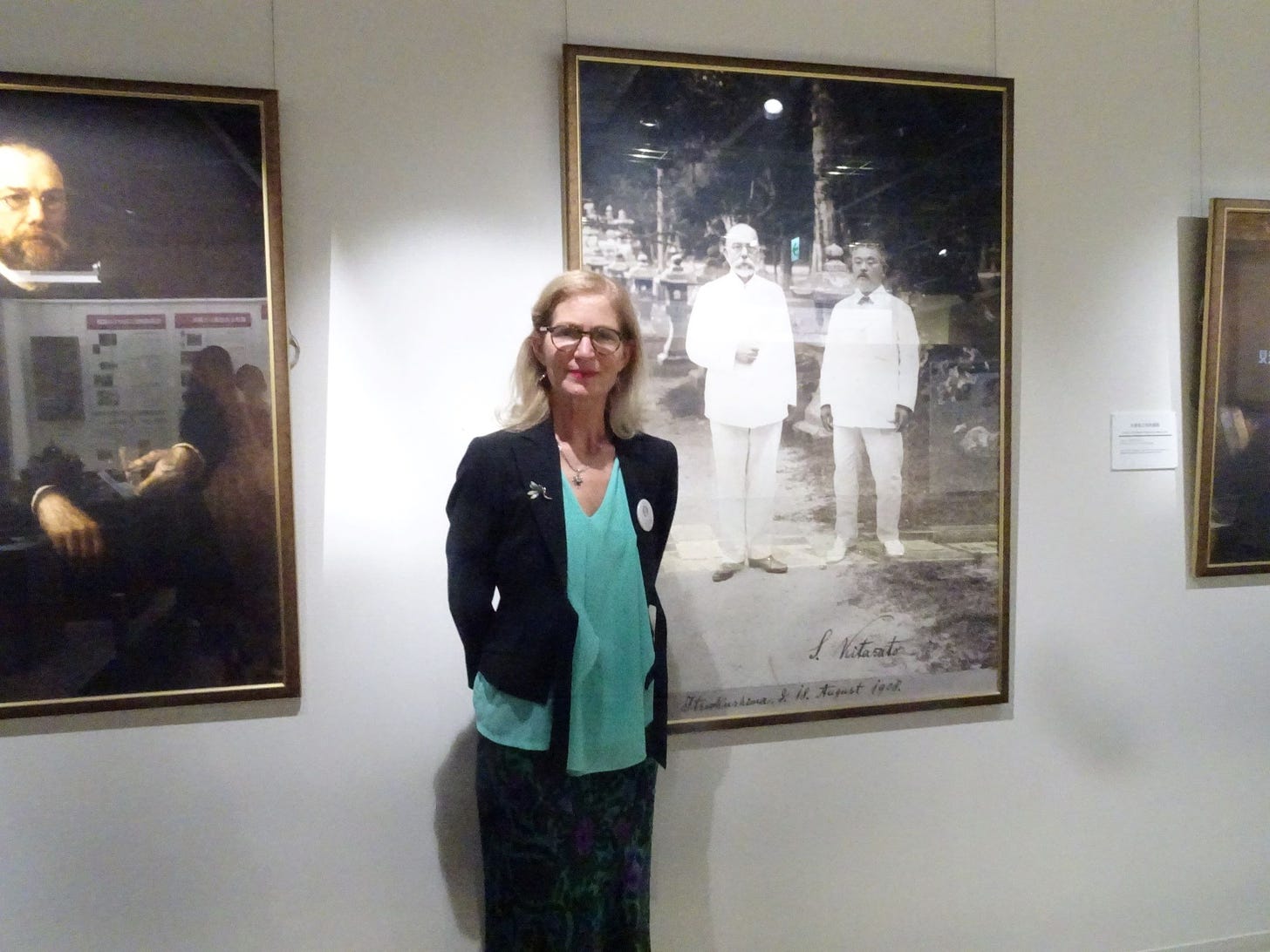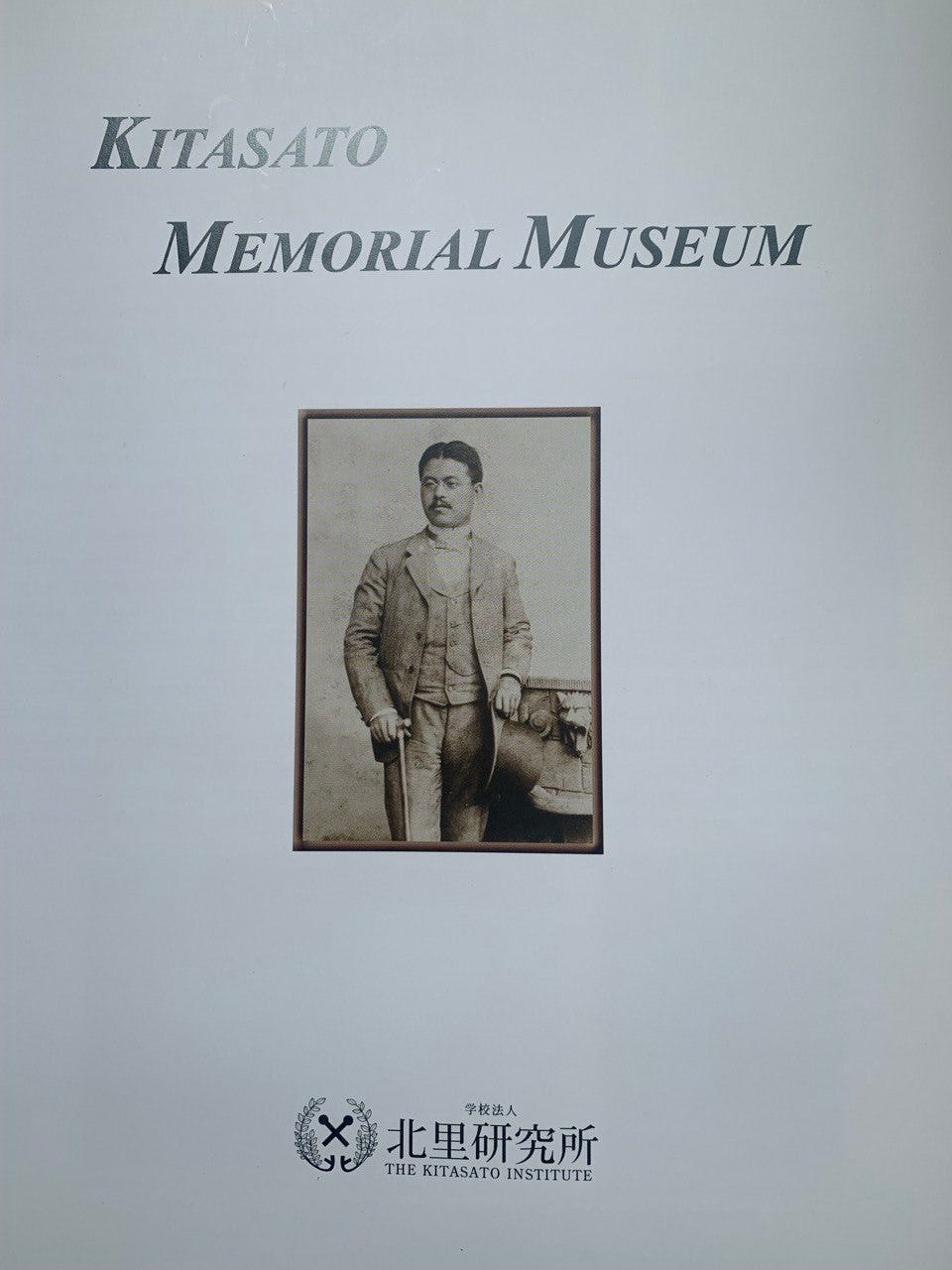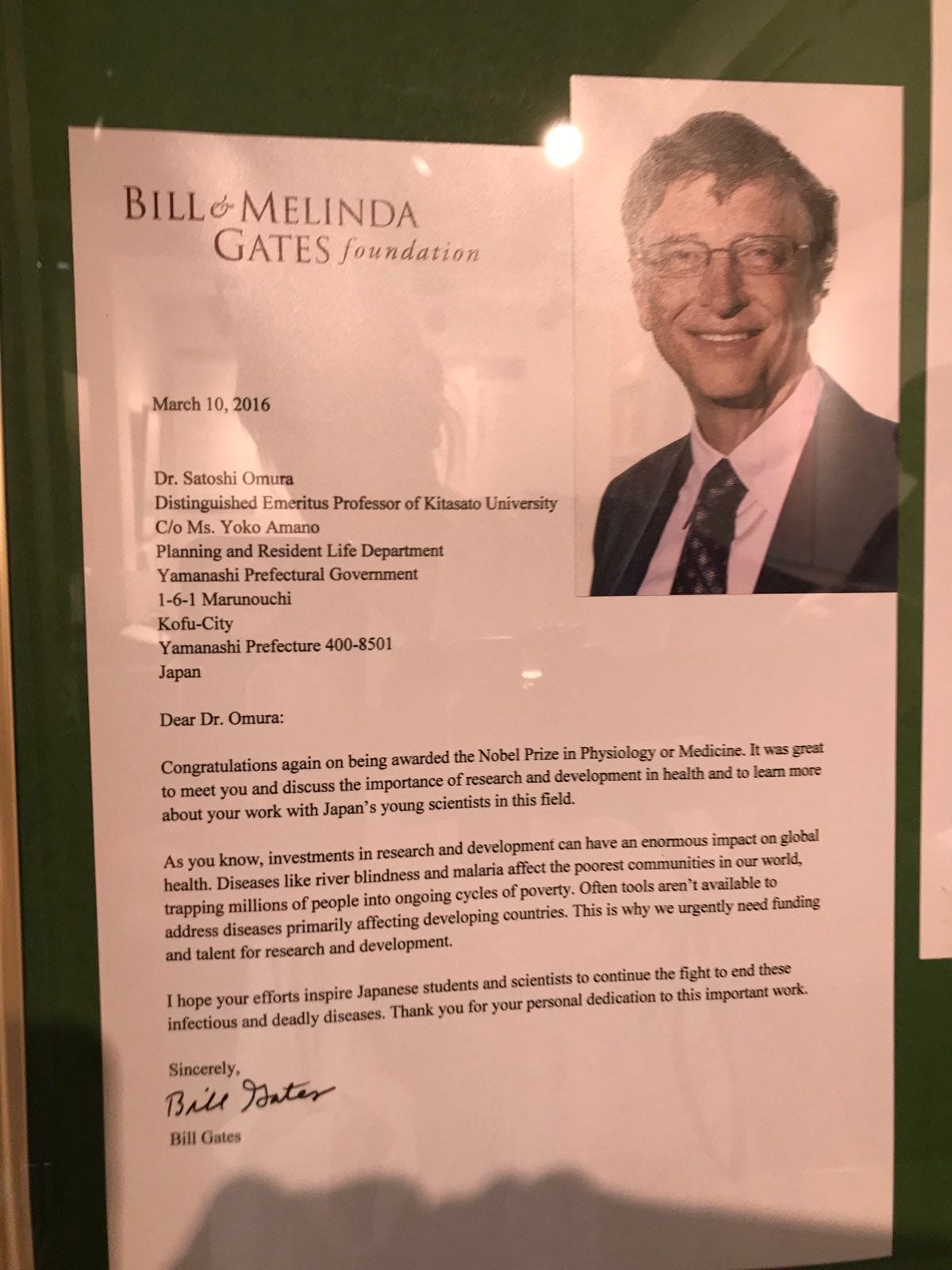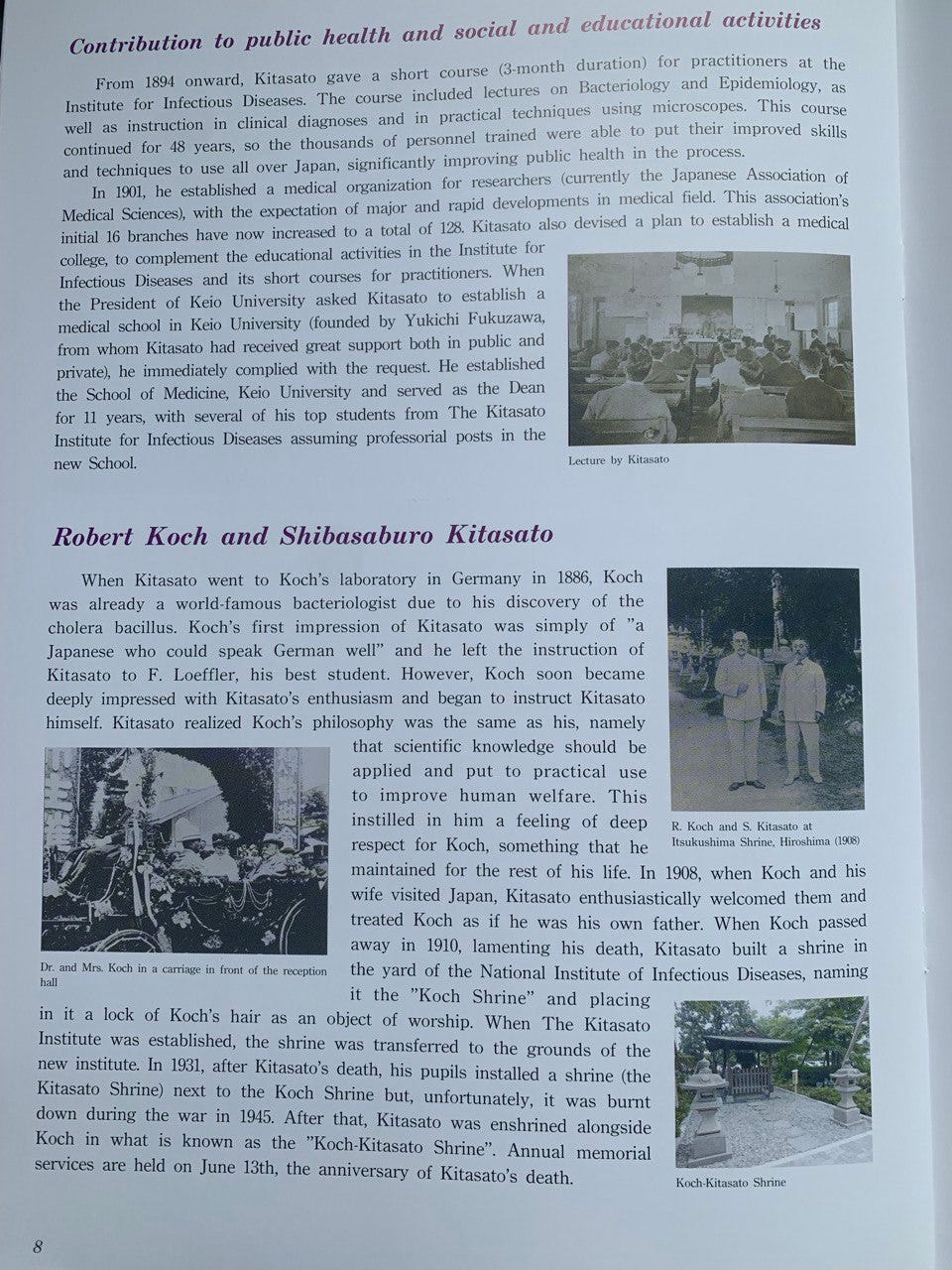Coming full circle with ivermectin and 'the science'
Reflections on spells cast by science in the name of civilisation
A highlight of our recent WCH mission in Japan was a guided tour of the Kitasato Memorial Museum by Professor Satoshi Omura. As you probably know by now, Professor Omura discovered avermectin, the precursor of ivermectin, on a Japanese golf course in the late 1970s. Due to this and his incredible work since, the museum has a whole wing dedicated to Prof. Omura’s work. I have previously written about this and shared some photos of what can be found there, including this curious 2016 letter from Mr Bill Gates.

Professors Shibasaburo Kitasato and Robert Koch
In the main section of the Kitasato Memorial Museum, what was of particular interest to me and of which I had no previous awareness was the close relationship between Professors Shibasaburo Kitasato and Robert Koch, the famous German microbiologist known as the ‘father of microbiology’, who pioneered the field of pathogenic bacteriology in the late 1800’s.
Koch’s four postulates are still widely referenced as the criteria to prove a causal relationship between a pathogen and a disease. They include:
a microorganism that causes a disease should be isolated from all people with the disease
the isolated microorganism must be grown in pure culture
the cultured microorganism always causes disease when inoculated into a healthy organism
the microorganism isolated from the inoculated organism should be identical to that isolated from the patient
Clearly, SARS-CoV 2 could not be causally linked to COVID disease according to Koch’s four postulates….
But on with the story…
Shibasaburo Kitasato was born in 1853 as the oldest son of the village headman of Kitasato Village in Kumamoto Prefecture. Obviously very bright, he studied Chinese classics from an early age and became a boarder at a school that taught traditional subject matter as well as Western thinking.

A book from the Kitasato Institute Museum notes that Kitasato enrolled in the study of medicine at a time when ‘in order to play a role on the global stage, a primary condition was the mastery of the Dutch language’. He became fascinated with the otherwise invisible world that he discovered with the use of a microscope. In addition, the Western concept of a civilised society seems to have made a significant impression on Kitasato.
Graduating from the Faculty of Medicine at the University of Tokyo in 1883, he was selected to become a student of Dr Robert Koch at the University of Berlin in 1886. Notably under Koch’s tutelage, Kitasato pioneered the culture of the tetanus bacterium. As the first Asian to join world-leading bacteriologists in 1891 at a congress in London, he received particular recognition for his work in the field of immunology.
Upon his return to Japan, Kitasato established a hospital for tuberculosis patients – the predecessor to the Kitasato Institute Hospital – and devoted his life to the modernisation of Japanese healthcare.
In 1914, when he established the private Kitasato Institute, he resigned from the government’s National Institute, proclaiming that the institute would “not confine itself to activities in medicine and hygiene, but will also engage in other fields, such as agriculture, fishery, industry and other spheres.”
In the Museum book that I received as a gift, another quote that has significant pathos for me now in light of our current modern health system gone rogue on viruses and ‘pandemics’, and the discussions on germ versus terrain origins of disease, is this one:
“The number of as yet unknown pathogens that can threaten human life are countless, and it can’t be predicted when they might cause an epidemic. Through the acquisition of adequate knowledge and technical expertise, those involved in heath care must continually be prepared for critical situations.”
There are echoes of these sentiments in current government agency propaganda, which makes me wonder how long we have all been under the spell of ‘the science’.
My reflections…
On academia and ‘the science’
These past years we have seen academia gone astray and mass worship of the 'science, there is a definite poignancy in reading the life achievements of this accomplished and dedicated Japanese scientist, who’s work was so integral to the germ theory of Western science.
In my life, I too at times have been enamoured with Western medical science, and recognise the sense of progress and superiority it cultivates. Thankfully, the Covid-19 deception has removed the blinkers from my eyes once and for all.
On ivermectin
I also find significant poignancy in appreciating that it is little old ivermectin, discovered by another outstanding Japanese scientist at the same esteemed Kitasato Institute, which has brought humanity full circle to the realisation that Western science is not all that it is cracked up to be, and that the general state of health, or the terrain of an organism, is at least equally important in health and hygiene considerations.
Fortunately, traditional and holistic practices that optimise health rather than focus on disease diagnosis and treatment are on the rebound in Japan and elsewhere.
Raising awareness of a better way for health and sovereignty is now my focus!
I’ll save the discussion about Mr Gates’ letter for another time as I am still not quite sure what to make of it. I look forward to reading your thoughts below.
Thank you!
Many thanks to readers for your interest and support and especially to paid Subscribers. If you find value in my articles and have the means, please become a paid subscriber. All proceeds go towards the work of the World Council for Health (including my efforts to co-create a better world with you).






Thanks for the fascinating history. Kitasato was not unlike many other good scientists in believing that a global vision of Philosopher Kings/Scientific Elites could run things better than independent thinkers, even though they themselves were -- at one point -- those independent thinkers. When you become an arm of government, you necessarily begin to see everything as "the Trolley Problem" and start picking winners and losers. As far as Gates and his efffusive letter, he was just trying to co-opt Omura to control his discovery and future output. The BMGF has hired many good scientists on the way to achieving its Malthusian agenda. The Faustian bargain is real: A very few of the scientists working for an organization like Gates' realize the end goal and their complicity. They'll have a thousand rationalizations for the things they do in the service of evil. After all, it's a "charitable" organization -- they're Helping People. You are one of the steadfast few who retained your moral compass. Thank you for that, Dr Lawrie.
Mr G is a hypocrite.